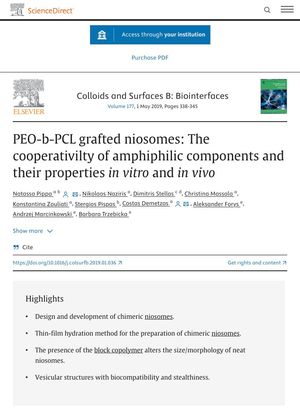PEO-b-PCL Grafted Niosomes: The Cooperativity of Amphiphilic Components and Their Properties In Vitro and In Vivo
January 2019
in “
Colloids and Surfaces B: Biointerfaces
”

TLDR The new drug delivery systems made with surfactants and block polymers are stable and not toxic.
In 2019, a study was conducted to design and develop systems composed of non-ionic surfactants (Tween 80, Span 80), cholesterol, and with or without poly(ethylene oxide)-b-poly(ε-caprolactone) (PEO-b-PCL) block copolymer. The nanosystems were formed using the thin-film hydration method. The results showed that the presence of the block copolymer significantly altered the size and morphology of the niosomes. The stability of these systems was found to be strongly dependent on the nature and the molar ratios of the components. Importantly, none of the studied nanosystems exhibited elevated signs of cellular toxicity in vitro nor acute systemic toxicity in vivo in short-term experiments. This investigation opened a new field of drug delivery platforms composed of different biomaterials, such as surfactants and block polymers.




